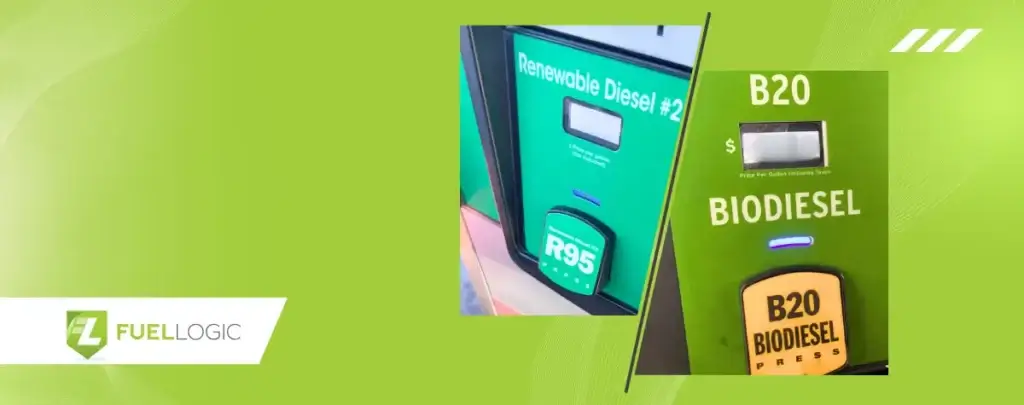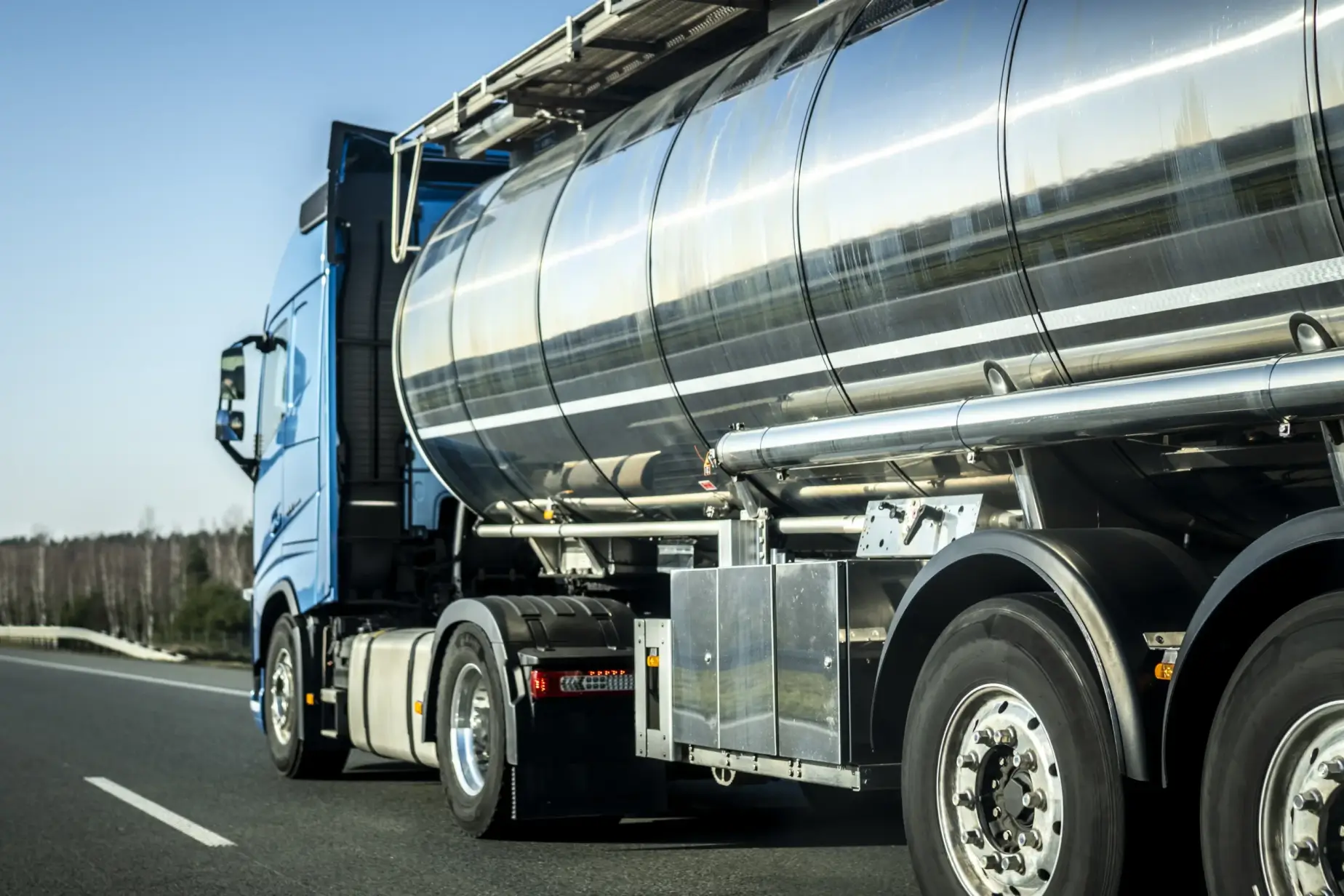TABLE OF CONTENTS
- What is Renewable Diesel?
- What is Biodiesel?
- What's the Difference Between Renewable Diesel and Biodiesel?
- How are Biodiesel and Renewable Diesel Produced?
- Comparing the Environmental Impacts
- Renewable Diesel vs Biodiesel Cost
- Choosing the Right Fuel for Your Needs
- FAQs (Frequently Asked Questions)
- What are the disadvantages of renewable diesel?
- Can I put renewable diesel in my diesel truck?
- Is renewable diesel the same as regular diesel?
- Can you use 100% renewable diesel?
- Is renewable diesel safe for diesel engines?
- What happens if you put biodiesel in a diesel engine?
- Which is the cleaner choice, renewable diesel vs. biodiesel?
- Power Your Business with the Right Fuel Choice
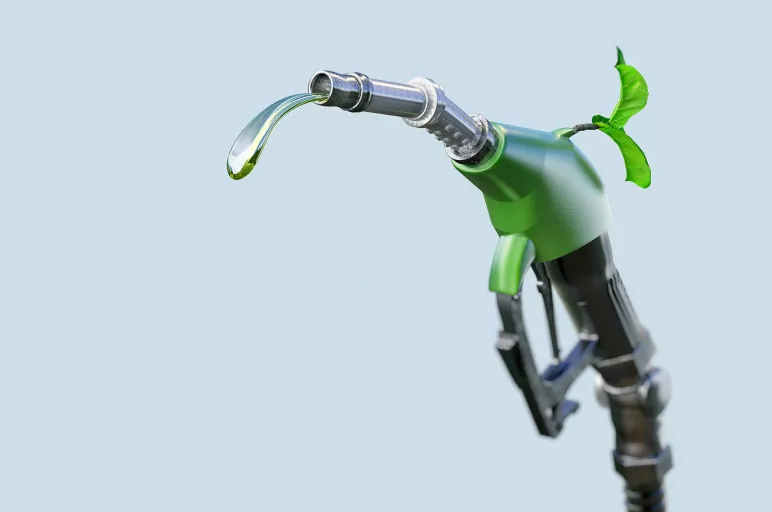
Several clean diesel fuels have emerged in the search for eco-friendly energy. Two notable ones are biodiesel and renewable diesel. These offer similar or even better performance than regular petroleum diesel. While renewable diesel vs. biodiesel are considered sustainable energy solutions, many people confuse them as the same. However, there’s a twist—there are apparent differences between them. If you are, too, puzzled about renewable diesel vs biodiesel, this guide is for you.
We’ll explore their fundamental differences, production methods, and environmental impact. Above all, we’ll highlight how these eco-friendly energy sources can benefit your business. So, keep reading to learn more!
What is Renewable Diesel?
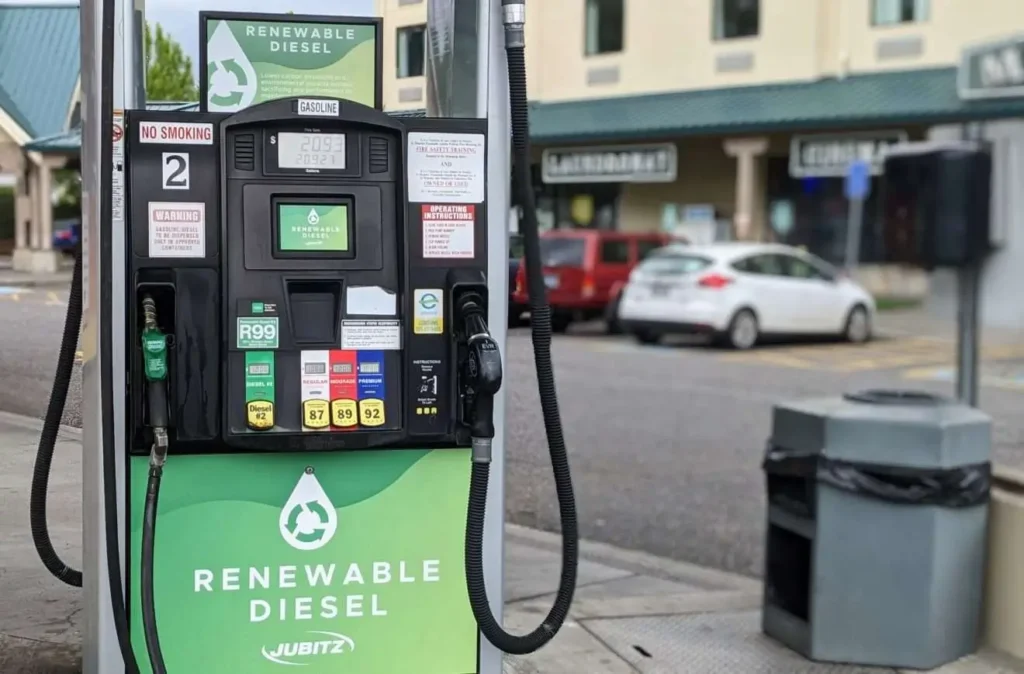
Renewable diesel, known as hydrotreated vegetable oil (HVO), is produced from organic sources like cooking oils, waste animal fats, and even microalgae via hydroprocessing.
One key feature of renewable diesel is its “drop-in” capability, which allows it to be used in diesel engines without any modifications. The process used to make renewable diesel is similar to regular diesel, which makes it chemically identical to petroleum diesel.
Although renewable diesel looks and acts like regular diesel, it’s more eco-friendly because it emits fewer carbon dioxide and nitrogen oxide emissions. California’s Low Carbon Fuel Standard Certified Carbon Intensities have shown that, on average, renewable diesel reduces carbon intensity by 65% compared to traditional fossil diesel.
What is Biodiesel?
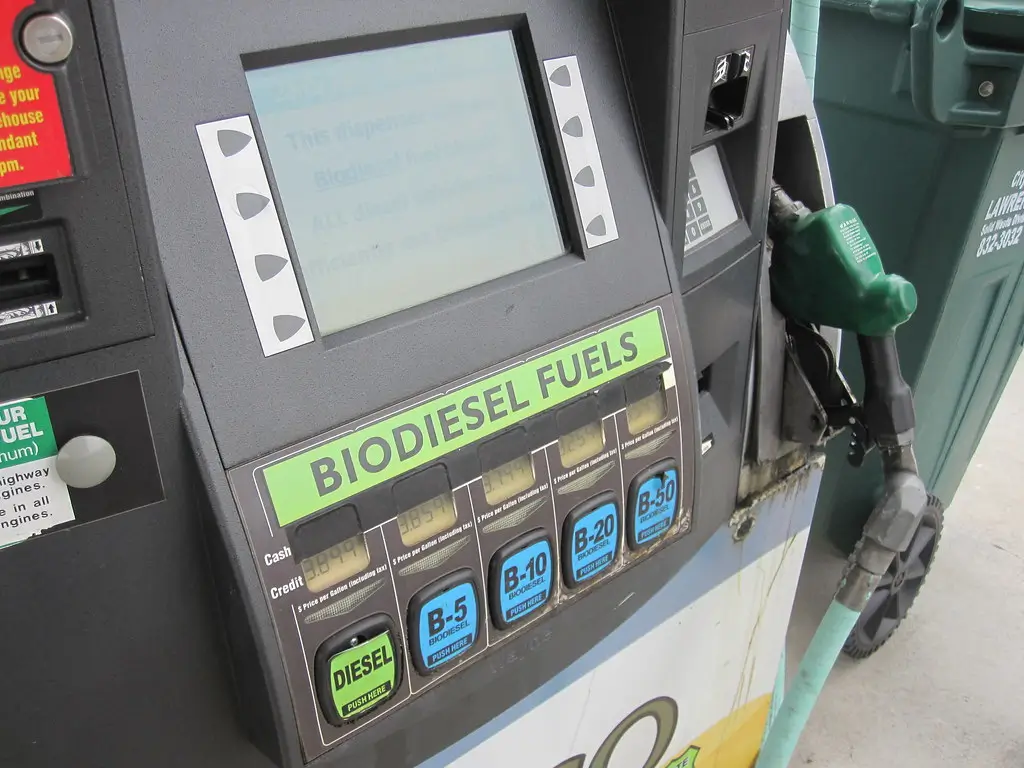
Biodiesel, also called fatty acid methyl ester (FAME), is made from vegetable oils, yellow grease, used cooking oils, and animal fats. It’s produced through transesterification, which turns fats and oils into two products: biodiesel and glycerin.
Unlike pure diesel, biodiesel is a mix of diesel and biofuel. The most common biodiesel blend is B20, which contains between 6% and 20% biodiesel mixed with regular petroleum diesel. Another standard blend is B5, which has 5% biodiesel and 95% regular diesel. These blends are often used in fleet vehicles.
What’s the Difference Between Renewable Diesel and Biodiesel?
In the transportation sector, there’s a shift towards greener options to reduce fossil fuel use. Biodiesel and renewable diesel have gained attention as sustainable diesel fuel choices for heavy-duty fleets. While some might use the terms interchangeably, it’s crucial to understand that they are different.
Let’s distinguish what is renewable diesel vs biodiesel:
Chemical composition:
Renewable diesel and biodiesel have different chemical compositions, impacting their use and performance. Renewable diesel is typically produced through hydroprocessing, which removes impurities from fats and oils.
In contrast, Biodiesel is produced through transesterification. Here, fats and oils are reacted with alcohol to produce fatty acid methyl esters (FAMEs).
Fuel Performance in Engines:
When deciding between biodiesel vs renewable diesel, it’s essential to determine how they perform in diesel engines. Renewable diesel resembles petroleum diesel in structure, enabling it to be used as a drop-in replacement without modifications. It maintains engine efficiency and power output while working perfectly with existing engine technologies.
On the other hand, biodiesel may require engine modifications or blending with petroleum diesel for ideal performance. Meanwhile, biodiesel can provide efficient power output, but due to its different chemical composition, compatibility issues might exist.
Cold Weather Performance:
Cold weather conditions can adversely affect fuel economy, so it’s essential to consider the differences in performance between renewable diesel and biodiesel. Renewable diesel performs well in freezing temperatures without gelling issues due to its chemical similarity to petroleum diesel.
In contrast, biodiesel may experience gelling problems in cold weather, affecting engine performance. This is because biodiesel has a higher cloud point and can solidify at lower temperatures than renewable diesel.
Feedstocks and production:
Various sources, such as vegetable oils and animal fats, are used for renewable diesel. These undergo hydrotreating, gasification, or pyrolysis to become renewable diesel fuel.
Biodiesel mostly comes from vegetable oils, recycled cooking oils, and animal fats. It’s made through transesterification, where these materials react with alcohol to produce biodiesel and glycerin.
Storage and handling:
Since renewable diesel is chemically similar to petroleum diesel, it can be stored and handled using existing infrastructure. It provides stability and compatibility, making storage and handling easier.
In contrast, biodiesel requires special considerations due to its higher susceptibility to degradation and microbial growth. To maintain its quality, it may need separate storage facilities and equipment.
How are Biodiesel and Renewable Diesel Produced?
Renewable diesel is mainly produced through hydroprocessing. In this process, the feedstock and a catalyst are mixed with hydrogen at high temperatures and pressure.
Hydroprocessing removes impurities like oxygen, sulfur, and nitrogen, making the resulting hydrocarbons similar to those in regular diesel. Renewable diesel is very similar to regular diesel and can be used the same way without any engine changes. That’s why it is often described as a “drop-in” fuel.
On the other hand, biodiesel, often called FAME (Fatty Acid Methyl Ester) biodiesel, is a mono-alkyl ester produced through transesterification. This process turns organic fats and oils into fatty acid alkyl esters by mixing them with alcohol and catalysts (usually KOH or NaOH).
About 100 pounds of oil or fat are mixed with 10 pounds of alcohol, usually methanol, to produce 100 pounds of biodiesel and 10 pounds of glycerin. In its production process, biodiesel retains some oxygen, which means it differs from regular diesel and has limitations on its blending capacity with regular diesel.
Comparing the Environmental Impacts
Renewable and biodiesel help reduce greenhouse gas emissions, combat climate change, and improve air quality. Renewable diesel reduces hydrocarbon and nitrogen oxide emissions, keeping the local air cleaner. Biodiesel effectively reduces emissions from vehicle exhaust, such as small particles, carbon monoxide, and hydrocarbons.
Biodiesel and renewable diesel are better choices than traditional diesel fuels because they emit fewer greenhouse gases throughout their lifecycle. When made from soybean, canola, and carinate oils, these fuels can cut emissions by 40% to 69%.
Renewable Diesel vs Biodiesel Cost
If you’re seeking an affordable fuel with good performance for your diesel engine, biodiesel could be a better option. Biodiesel also costs less than the regular petroleum diesel.
Biodiesel is typically less expensive than renewable diesel because it’s not a complete substitute option. Furthermore, the quality and concentration of renewable diesel are other factors that make it more expensive. Renewable diesel is of higher quality than biodiesel.
Choosing the Right Fuel for Your Needs

Choosing the right fuel for your vehicle depends on factors like vehicle type, location, environmental goals, and cost-effectiveness. For personal vehicles, consider fuel availability, compatibility, and environmental impact. For example, renewable diesel is an excellent option in cold climates as it doesn’t wax up and provides better mileage.
Similarly, commercial fleets, trucks, and emergency vehicles need top-quality fuel. Both biodiesel and renewable diesel meet this requirement. However, when comparing renewable diesel vs biodiesel, renewable diesel stands out because it burns very cleanly.
Moreover, renewable diesel is also a better choice for heavy-duty machinery in industrial settings due to its efficiency and lower emissions. Meanwhile, biodiesel can be more suitable for boilers and heating systems because of its cost-effectiveness.
FAQs (Frequently Asked Questions)
What are the disadvantages of renewable diesel?
Renewable diesel has some disadvantages, such as its sourcing from palm oil, which leads to deforestation. Moreover, its price is also a drawback, as it is costlier than petroleum diesel, although some states offer discounts through legislation.
Can I put renewable diesel in my diesel truck?
Yes, you can put renewable diesel in your diesel truck. It meets the same fuel quality standards as petroleum diesel (ASTM D975) and can be used in existing diesel engines and refueling infrastructure without any modifications.
Is renewable diesel the same as regular diesel?
No, renewable diesel is not the same as regular diesel. Regular diesel is produced from the fractional distillation of crude oil, while renewable diesel is made from fats and oils like soybean or canola oil. However, renewable diesel is processed to be chemically identical to petroleum diesel.
Can you use 100% renewable diesel?
Yes, you can use 100% renewable diesel. It’s a pure hydrocarbon diesel fuel with a chemical composition similar to fossil diesel. You can use it as a drop-in replacement without any modifications.
Is renewable diesel safe for diesel engines?
Renewable diesel is safe for diesel engines because it meets the same fuel quality standards as petroleum diesel and has a chemical composition similar to fossil diesel.
What happens if you put biodiesel in a diesel engine?
If you put biodiesel in a diesel engine, it raises the fuel’s cetane number, making it easier for the engine to start and reducing ignition delay. Furthermore, biodiesel improves fuel lubricity, which helps prevent moving parts from wearing out too quickly in diesel engines.
Which is the cleaner choice, renewable diesel vs. biodiesel?
Renewable diesel is the cleaner choice because it can directly replace fossil diesel without any performance issues, as they have identical chemical compositions.
Power Your Business with the Right Fuel Choice
Both biodiesel and renewable diesel offer significant advantages over traditional petroleum diesel. It emphasizes the importance of adopting sustainable fuels to address environmental challenges and promote a greener future.
Renewable diesel is a cleaner choice because it can seamlessly replace fossil diesel without compromising performance. Its chemically identical nature makes it effective in reducing emissions and environmental impact.
Now that you know the differences between biodiesel vs renewable diesel, the choice is yours. Choose the one that suits your business requirements. However, if you need any assistance with diesel fuel delivery, Fuel Logic is here to help you.
Fuel Logic offers hassle-free fuel delivery services to keep your businesses running uninterrupted.
So, contact us today and order the fuel you need right at your business site.

